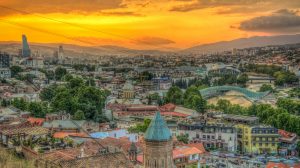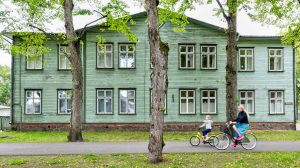Stereotypes are like old, worn-out labels that people slap onto others without really thinking. They’re based on the idea that everyone in a certain group is the same.
Artificial intelligence might be the most important technology we ever develop. Ensuring it is safe, trustworthy and responsible is one of the best ways we can safeguard the long-term future.
Emerging Europe was founded over a decade ago to play a role in bringing the emerging Europe region together, to promote its unity to the world, and to drive it forward, empowering and connecting people and organisations to prosper.
- Is the language we use to describe emerging Europe finally changing?
- Eastern Europe? Ex-Soviet? A new campaign sets out to end lazy stereotypes
- We Don’t Do This: Revealing intimacy in Baltic art
It’s a drum that Emerging Europe has been beating for some time: the need for anyone with a stake in the region to draw a line under communism to ensure that the divisions of the past do not define the future. This drum plays yet another tune—the song about dropping the stereotypes that in a lot of cases are long gone.
Impaired generative transformer
Driven by curiosity, I asked ChatGPT about the 10 biggest stereotypes about the people of the Central and Eastern European countries. Here’s what I learnt:
“They are heavy drinkers: There’s a common belief that people from Central and Eastern Europe drink a lot, especially vodka and beer.
They love meat: It’s often thought that these populations eat mostly meat and potatoes, with very few vegetables or fruits in their diet.
They don’t smile much: Some say that folks from these regions don’t smile often and can seem unfriendly to strangers.
They throw hardcore partiers: There’s a stereotype that Central and Eastern Europeans love to party hard, especially in countries like Poland and Hungary.
They are tough and serious: People often think of Central and Eastern Europeans as being very tough, serious, and resilient, possibly due to their history.
They have traditional views: They are sometimes seen as having very traditional views, particularly when it comes to gender roles and family.
They are hostile to outsiders: A stereotype exists that they can be xenophobic or unwelcoming to foreigners and different cultures.
They have a communist mindset: Despite the fall of communism decades ago, some still believe that people from these areas prefer communist ideals.
They have poor English skills: There’s an assumption that Central and Eastern Europeans can’t speak English well or are reluctant to use it.
There is a lot of corruption and crime: Unfortunately, there’s a stereotype that these countries have high levels of corruption and organised crime.”
Trying to offer balance
I also asked the opinions of an AI tool offered by ClickUp, a collaborative platform. Here the answer was slightly different:
“Stereotypes are oversimplified ideas about groups of people, and they can be pretty unfair. When it comes to Central and Eastern European countries, there are a few common stereotypes that you might hear.
They’re all serious and never smile: Some people think that folks from these regions are always serious and don’t like to have fun. But that’s not true! Just like anywhere else, people in Central and Eastern Europe enjoy a good laugh and have a rich sense of humour.
It’s always cold and grey: Another stereotype is that these countries are constantly chilly and the skies are always gray. While it’s true that winters can be tough, these countries also experience beautiful springs, warm summers, and colorful autumns.
Everyone drinks a lot of vodka or beer: It’s a common belief that people from this area drink a lot of alcohol, especially vodka and beer. Although these drinks are popular and part of some cultural traditions, it’s an exaggeration to say everyone drinks them excessively.
The cuisine is limited to meat and potatoes: Some folks might think the food in Central and Eastern Europe isn’t very diverse and mainly consists of meat and potatoes. In reality, the cuisine is varied and includes a wide range of dishes with lots of flavors and ingredients.
The region is less developed: There’s a stereotype that these countries are not as modern or developed as Western Europe. This isn’t accurate; many Central and Eastern European countries have thriving cities, advanced technology, and vibrant cultures.”
An open mind
I am not going to address these ideas. What I can say is that I have been to 70 countries across the globe and I could make the very same comments about other countries and regions. Does that make sense? Absolutely not!
Stereotypes are like old, worn-out labels that people slap onto others without really thinking. They’re based on the idea that everyone in a certain group is the same. But are they? Again, absolutely not!
Believing in stereotypes can hold us back from making new friends and learning new things. Would I like to only hang out with people who are just me? Absolutely not!
Breaking free from stereotypes opens up a whole world of possibilities. It lets us see people, cultures, countries, regions for who and what they really are. I personally learnt more about the world while travelling than I ever learnt at school.
Photo by Ammy Singh on Unsplash.
Unlike many news and information platforms, Emerging Europe is free to read, and always will be. There is no paywall here. We are independent, not affiliated with nor representing any political party or business organisation. We want the very best for emerging Europe, nothing more, nothing less. Your support will help us continue to spread the word about this amazing region.
You can contribute here. Thank you.







Add Comment